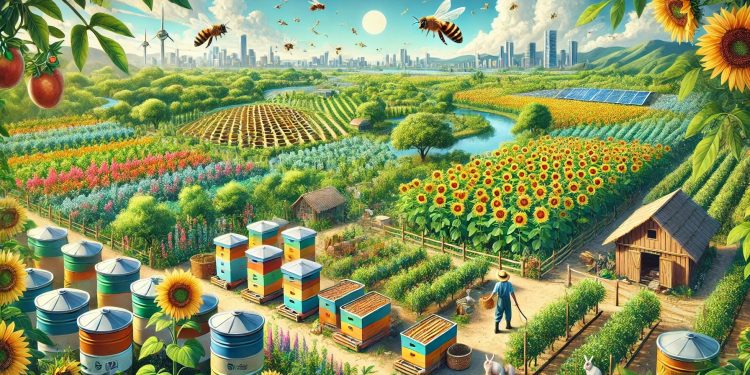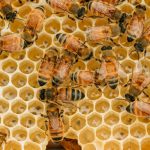Beekeeping is at the core of Honey Crib, but it’s a long-term investment. The biggest reason? It takes about a year from when a hive is occupied (not just placed in the apiary!) for the colony to grow strong enough to produce honey in good quantities. Other delays arise from forage shortages, pests, and lack of water.
To cover operational costs while waiting for my ROI, I had to get creative. After lots of trial and error, I landed on a circular business model that has been a game-changer.
Beekeeping: A Pillar of Pollination and Biodiversity
Honey: Beekeeping lies at the heart of our operations. By maintaining healthy apiaries, Honey Crib fosters biodiversity, as the farm plants native and nectar-rich flora to sustain the hives year-round while producing honey, beeswax, and propolis.
Beehives: Honey Crib also fabricates beehives for their farm using locally sourced materials to reduce costs. This led me to discover another revenue-generating pipeline by selling beehives to local farmers to help pollinate their crops and generate revenue from honey.
Byproducts: Beekeeping byproducts are used both commercially and on the farm, reducing waste and creating a circular economy. For instance, the waste honeycombs are melted and used in new beehives.
Sunflower Farming: A Dual-Purpose Crop
Sunflowers are more than a beautiful addition to the farm; they serve as a key component of Honey Crib’s climate-smart strategies. One of the main reasons I chose Sunflower is because these resilient plants thrive in semi-arid conditions, making them ideal for the farm’s environment in Machakos County, Kenya. Sunflowers provide nectar for bees, contributing to honey production, while their seeds are harvested and sold for oil and as a protein-rich feed for livestock. I attribute my honey production increase mainly to sunflower farming. Additionally, sunflower farming helps improve soil structure and prevents erosion, promoting long-term soil health.
Passion Fruit Farming: High-Value, Climate-Resilient Produce
Passion fruit farming at Honey Crib combines economic opportunity with environmental stewardship. These high-value crops are well-suited to the region’s climate and require minimal water compared to other fruits. The farm employs organic practices, such as using compost and avoiding chemical pesticides, to ensure that the fruits are not only delicious but also sustainable. Passion fruit vines benefit from the farm’s pollinator-friendly environment, creating a synergy between the crops and the bees. This is a long-term investment of at least one year and a new project on the farm.
Rabbit Farming: Enhancing Soil Fertility and Food Security
Rabbit farming is another integral aspect of Honey Crib’s operations. Rabbits are efficient to rear, requiring less land and feed compared to larger livestock. Their manure is a valuable source of organic fertilizer, rich in nutrients that improve soil fertility. This natural fertilizer is used across the farm to enrich the soil for crops like sunflowers and passion fruits. The rabbit urine is also used on the crops as an organic pesticide. Additionally, rabbits provide a sustainable source of protein for the local community, contributing to food security. This is a short-term investment and allows the farm to cater to its operational costs.
Climate-Smart Practices in Action
Honey Crib employs a range of climate-smart practices to mitigate the challenges of climate change. Water conservation is a priority, with rainwater harvesting systems and drip irrigation ensuring efficient water use. Crop rotation and intercropping are implemented to maintain soil fertility and reduce pest infestations naturally. By focusing on regenerative agriculture, Honey Crib ensures that its farming methods restore rather than deplete the land.
Conclusion: A Model for Sustainable Agriculture
Through this integrated approach, we have learned that sustainable agriculture is not only achievable but also essential for addressing food security and environmental challenges. By combining beekeeping, sunflower farming, passion fruit cultivation, and rabbit rearing, the farm creates a resilient ecosystem where each component supports the other.
I would like to highlight the immense potential of circular business models in farming. These strategies not only enhance operational efficiency but also reduce costs and increase revenue while protecting the environment. Farmers, regardless of their focus, should explore how they can integrate circular practices into their businesses. From adopting regenerative agriculture to leveraging byproducts, small changes can lead to significant benefits.
As we continue to innovate, we aim to plant seeds of sustainability for future generations. Let’s work together to create a future where farming supports both livelihoods and the planet.










